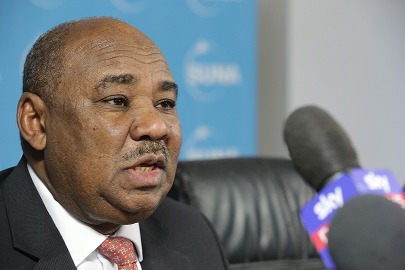Hard currency shortages prompted borrowing from private firms: Sudan’s minister
March 6, 2020 (KHARTOUM) – Sudan finance minister said the country’s failure to pay a bill of wheat prompted his government to strike a deal with a private company to export gold and to use its income to ensure the country’s basic commodities.

Sudan needs $302 million every month to purchase wheat ($ 45m) fuel $212m) and medicines ($45m) with some variations, according to al-Badawi.
“In the second week of December 2019, wheat stocks reached a critical stage, and the Bank of Sudan was unable to provide foreign currency to pay the costs of 50,000 tons of wheat,” he further said.
This emergency forced them to borrow the needed $28 million from the little-known Al-Fakher Company for Advanced Business (ACAB), which in return was repaid in local currency and allowed to export gold to the international market.
The minister denied that he gave the ACAB the monopole of gold exportation, saying he decided to open gold exportation to the private sector after being controlled by the central bank as of 1 January 2020.
At the time, the government said it took this decision to end gold smuggling and to attract foreign currency.
The minister denied wrongdoing stressed he acted under the Government Contracting and Procurement Law which authorizes the Minister of Finance to contract with companies in exceptional circumstances.
Al-Badawi was accused of allowing the company to export five tons of gold with NIL VALUE, meaning that the company has no obligation to deposit its income in its banking account in Sudan or pay a value-added tax to the government.
Minister al-Badawi has been criticized for biting on probable Sudan’s removal of the terror list and the support of international financial institutions which will take several years before to be effective.
During his press conference which was attended also by traders, the minister was sharply criticized and some went even to request his resignation.
The date of the press conference coincided with a meeting for the two executive bodies – Sovereign Council and the government – with Forces For Freedom and Change (FFC) to discuss the economic situation in the country.
Crisis Management Committee
Following the meeting, Prime Minister Abdallah Hamdok announced the formation of a higher mechanism for managing the economic crisis.
The crisis management mechanism will be tasked with providing basic commodities including fuel, wheat and medicine, said Hamdok.
Also, the mechanism will review the income and outgo policy of the government, he added and provide the needed support for the agriculture sector.
The prime minister did not announce the composition of the crisis committee but the formation of this body suggests that al-Badawi will have to work its members.
Several FFC forces during the past months called to focus on the development of the national resource and stop waiting for uncertain international support depending on the U.S. administration which focuses more on its internal interests and the presidential election in November 2020.
Washington said ending sanctions on Sudan is a complicated process involving the Congress and related to several laws and not only the terror list.
(ST)
